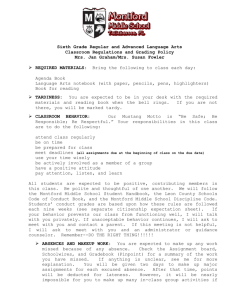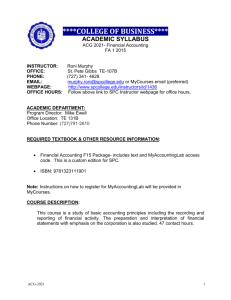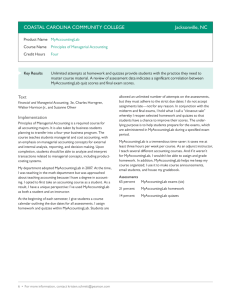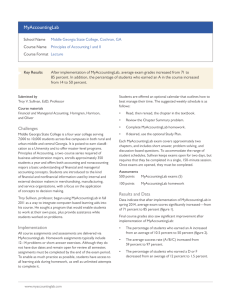Course Syllabus - St. Petersburg College
advertisement
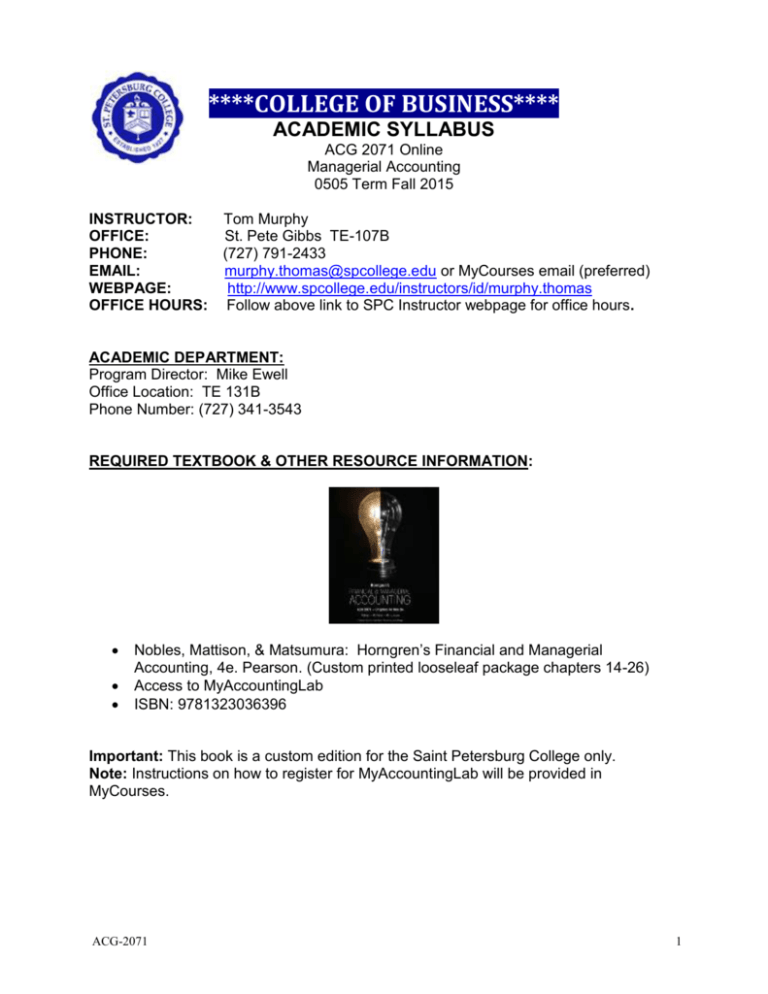
****COLLEGE OF BUSINESS**** ACADEMIC SYLLABUS ACG 2071 Online Managerial Accounting 0505 Term Fall 2015 INSTRUCTOR: OFFICE: PHONE: EMAIL: WEBPAGE: OFFICE HOURS: Tom Murphy St. Pete Gibbs TE-107B (727) 791-2433 murphy.thomas@spcollege.edu or MyCourses email (preferred) http://www.spcollege.edu/instructors/id/murphy.thomas Follow above link to SPC Instructor webpage for office hours. ACADEMIC DEPARTMENT: Program Director: Mike Ewell Office Location: TE 131B Phone Number: (727) 341-3543 REQUIRED TEXTBOOK & OTHER RESOURCE INFORMATION: Nobles, Mattison, & Matsumura: Horngren’s Financial and Managerial Accounting, 4e. Pearson. (Custom printed looseleaf package chapters 14-26) Access to MyAccountingLab ISBN: 9781323036396 Important: This book is a custom edition for the Saint Petersburg College only. Note: Instructions on how to register for MyAccountingLab will be provided in MyCourses. ACG-2071 1 COURSE DESCRIPTION: Prerequisite: ACG 2021. This course is a study of product costing, cost-volumeprofit analysis, budgetary planning and control, the statement of cash flows and financial statement analysis. Emphasis will be placed on applications in order to illustrate the accounting principles. 47 contact hours. MAJOR LEARNING OUTCOMES: 1. The student will understand the importance of product costing and will describe its impact on financial statements and managerial decision-making. 2. The student will understand cost-volume-profit relationships and will apply them to business problems. 3. The student will understand budgetary planning and control and will prepare a master budget, using standard cost systems, and capital budgeting techniques. 4. The student will format and complete the statement of cash flows and apply the information to business problems. 5. The student will understand the importance of financial statement analysis and will perform such an analysis. CLASS SCHEDULE: MODULE Starting our Course: Orientation & Module 1 TOPIC Starting Our Course: Orientation CH 14 (Appendix D) Statement of Cash Flows: 1. Identify the purposes of the statement of cash flows and distinguish among operation, investing, and financing cash flows 2. Prepare the statement of cash flows by the indirect method 3. Use free cash flow to evaluate business performance 4. Prepare the statement of cash flows by the direct method 5. Prepare the statement of cash flows by the indirect method using a spreadsheet ASSIGNMENTS Acceptance of Syllabus and Course Expectations Quiz (Starting our Course: Orientation*) Homework CH14: (Graded Assignments in MyAccountingLab) Chapter Exam CH14: (Graded Assignments in MyAccountingLab) Module 1 “Real-World” Discussion-Forum *NOTE: You will not have access to the “module” content of the course until this quiz has been completed. ACG-2071 2 MODULE Module 2 TOPIC CH 15 (Appendix E) Financial Statements Analysis: 1. Explain how financial statements are used to analyze a business 2. Perform a horizontal analysis of financial statements 3. Perform a vertical analysis of financial statements 4. Compute and evaluate the standard financial ratios 5. Complete a corporate income statement including earnings per share ASSIGNMENTS Homework CH15: (Graded Assignments in MyAccountingLab) Chapter Exam CH15: (Graded Assignments in MyAccountingLab) Module 2 “Real-World” Discussion-Forum Begin Comprehensive Problem (Graded Assignments in MyAccountingLabChapter 15) Module 3 CH 16 Introduction to Managerial Accounting: 1. Define managerial accounting and understand how it is used 2. Describe the difference between service, merchandising, and manufacturing companies 3. Classify costs for service, merchandising, and manufacturing companies 4. Prepare an income statement and schedule of cost of goods manufactured for a manufacturing company and calculate cost per item 5. Calculate cost per service for a service company and cost per item for a merchandising company CH 17 Job Order Costing: 1. Distinguish between job order costing and process costing 2. Record materials and labor in a job order costing system 3. Calculate the predetermined overhead allocation rate and allocate overhead costs 4. Record completion and sales of finished goods 5. Adjust for overallocated and underallocated overhead 6. Calculate job costs for a service company ACG-2071 Homework CH16: (Graded Assignments in MyAccountingLab) Homework CH17: (Graded Assignments in MyAccountingLab) Chapter Exam CH16&17: (Graded Assignments in MyAccountingLab) Module 3 “Real-World” Discussion-Forum Continue working on Comprehensive Problem (Graded Assignments in MyAccountingLabChapter 15) 3 MODULE Module 4 Module 5 TOPIC ASSIGNMENTS CH 18 Process Costing: 1. Describe the flow of costs through a process costing system 2. Calculate equivalent units of production for direct materials and conversion costs 3. Prepare a production cost report using the weighted-average method 4. Prepare journal entries for a process costing system 5. Use a production cost report to make decisions Homework CH18: (Graded Assignments in MyAccountingLab) CH 20 Cost-Volume-Profit Analysis: 1. Determine how changes in volume affect costs 2. Calculate operating income using contribution margin and contribution margin ratio 3. Use cost-volume-profit (CVP) analysis for profit planning 4. Use CVP analysis to perform sensitivity analysis 5. Use CVP analysis to calculate margin of safety, operating leverage, and multiproduct breakeven points Module 4 “Real-World” Discussion-Forum CH 21 Variable Costing: 1. Distinguish between variable costing and absorption costing 2. Compute operating income using variable costing and absorption costing 3. Use variable costing to make management decisions for a manufacturing business 4. Use variable costing to make management decisions for a service business Homework CH20: (Graded Assignments in MyAccountingLab) Chapter Exam CH18&20: (Graded Assignments in MyAccountingLab) Continue working on Comprehensive Problem (Graded Assignments in MyAccountingLabChapter 15) Homework CH21: (Graded Assignments in MyAccountingLab) Homework CH22: (Graded Assignments in MyAccountingLab) Chapter Exam CH21&22: (Graded Assignments in MyAccountingLab) Module 5 “Real-World” Discussion-Forum Due Comprehensive Problem (Graded Assignments in MyAccountingLabChapter 15) ACG-2071 4 MODULE TOPIC Module 5 (continued) CH 22 Master Budgets: 1. Describe budgeting objectives, benefits, and procedures and how human behavior influences budgeting 2. Define budget types and the components of the master budget 3. Prepare an operating budget for a manufacturing company 4. Prepare a financial budget for a manufacturing company 5. Describe how information technology can be used in the budgeting process 6. Prepare an operating budget for a merchandising company 7. Prepare a financial budget for a merchandising company Module 6 CH 23 Flexible Budgets and Standard Cost Systems: 1. Prepare flexible budgets and performance reports using static and flexible budgets 2. Identify the benefits of a standard cost system and understand how standards are set 3. Compute standard cost variances for direct materials and direct labor 4. Compute the standard cost variances for manufacturing overhead 5. Describe the relationship among and responsibility for the product cost variances 6. Record transactions in a standard cost system and prepare a standard cost income statement ASSIGNEMENTS Homework CH23: (Graded Assignments in MyAccountingLab) Homework CH24: (Graded Assignments in MyAccountingLab) Chapter Exam CH23 & 24: (Graded Assignments in MyAccountingLab) Module 6 “Real-World” Discussion-Forum CH 24 Responsibility Accounting and Performance Evaluation: 1. Explain why companies decentralize and use responsibility accounting 2. Describe the purpose of performance evaluation systems and how the balanced scorecard helps companies evaluate performance 3. Use responsibility reports to evaluate cost, revenue, and profit centers 4. Use return on investment (ROI) and residual income RI, to evaluate investment centers 5. Determine how transfer pricing affects decentralized companies ACG-2071 5 MODULE Module 7 TOPIC CH 25 Short Term Business Decisions: 1.Describe information that is relevant for making short-term decisions 2.Make regular and special pricing decisions 3.Make decisions about dropping a product, product-mix, and sales mix decisions 4. Make outsourcing and processing further decisions CH 26 Capital Investment Decisions: 1.Describe the importance of capital investments and the capital budgeting process 2.Use the payback period and rate of return methods to make capital investment decisions 3.Use the time value of money to compute the present of single lump sums and annuities 4.Use discounted cash flow methods to make capital investment decisions Module 8 Review of all the Chapters and Prepare for the Cumulative Final Exam. ASSIGNMENTS Homework CH25: (Graded Assignments in MyAccountingLab) Homework CH26: (Graded Assignments in MyAccountingLab) Chapter Exam CH25 & 26: (Graded Assignments in MyAccountingLab) Module 7 “Real-World” Discussion-Forum Final Exam ReviewBonus: (Graded Assignments in MyAccountingLab) Cumulative Final Exam: (Graded Assignments in MyAccountingLab) IMPORTANT DATES: Course dates: 8/17/15 - 12/11/15 Last day to drop and receive a refund: 8/21/15 Last day to withdraw and receive a grade of “W”: 10/22/15 Academic calendar: http://www.spcollege.edu/calendar/ Financial Aid: http://www.spcollege.edu/getfunds/ ACG-2071 6 DISCIPLINE SPECIFIC INFORMATION: Accounting, in general is a challenging subject that requires a lot of patience, perseverance, practice and study to learn. This is an intensive course. It is recommended to dedicate a minimum of 12-15 hours per week (in an 8-week session) and 6-7.5 hours per week (in a 16-week session) to its study. Online and blended classes give the student a lot of flexibility in regards to study time but it is imperative to get organized and set a consistent time per week to master the learning objectives and complete the assessments of this course. The learning process can be very demanding, but at the same time it will be very rewarding. The world of accounting is fascinating and will help you develop a new set of skills that will open the doors to a whole new world of opportunities. ATTENDANCE: The college-wide attendance policy is included in the Syllabus Addendum at: http://www.spcollege.edu/webcentral/policies.htm Students classified as “No Show” for both of the first two weeks will be administratively withdrawn from the class. A “No Show” means not completing the Acceptance of Syllabus/Course Expectations Quiz and not registering for MyAccountingLab for week one and no attempt of (discussion forum, homework & chapter exam) assignments as stated in the course syllabus for week two. Students who have not completed more than 40% of their assignments due (discussion forum, homework & chapter exams) at the 60% point will be considered as “not actively participating” in the class and may be administratively withdrawn with a grade of “WF”. GRADING: Grades will be earned in five parts, as follows: “Real-World” Discussion Forum (class participation) ----10% Homework (5 attempts*, unlimited time) -------------20% Chapter Exams (1 attempt, time limit) ----------------------- 45% Comprehensive Problem (5 attempts*, unlimited time) - 10% Cumulative Final Exam (1 attempt, time limit) ------------- 15% Total percentage ------------------------------------------------- 100.00% A B C D F 90 - 100% 80 - 89% 70 - 79% 60 - 69% Less than 60% *1 attempt of each question, 5 attempts of “check answer” for each part ACG-2071 7 ASSIGNMENTS: It will be the students’ responsibility to complete their assignments on time and in an acceptable manner. Thus, late assignments will not be accepted unless granted by the instructor. If you have an extenuating circumstance please e-mail your instructor to request an extension. Assignments that are not completed by the due date will receive a zero (0). In consideration of personal contingencies, the instructor will drop the student’s lowest score on homework and chapter exams. With this rule, the student will not be penalized for a low score on a homework and chapter exam. Please pay attention to the instructions for every assignment such as due date, time allowed (if that is the case), maximum attempts, etc. The instructions will be displayed in MyAccountingLab. The due date for assignments will be posted by the instructor in MyAccountingLab and D2L. Academic Support and Student Success (Tutoring, Libraries, Student Services): http://www.spcollege.edu/support/ STUDENTS’ AND INSTRUCTOR’S EXPECTATIONS: Online /Student Conduct http://www.spcollege.edu/ecampus/help/conduct.htm Online Student, Faculty and Staff Expectations and Performance Targets http://www.spcollege.edu/ecampus/help/expectations.htm Academic Honesty Policy http://www.spcollege.edu/AcademicHonesty/ STUDENT SURVEY OF INSTRUCTION: The student survey of instruction is administered in courses each Fall & Spring semester. It is designed to improve the quality of instruction at St. Petersburg College. All student responses are confidential and anonymous and will be used solely for the purpose of performance improvement. SYLLABUS CHANGES: Will be posted in MyCourses and announced to all students. SYLLABUS ADDENDUM: Please make sure you read the information in the addendum. http://www.spcollege.edu/webcentral/policies.htm ACG-2071 8





